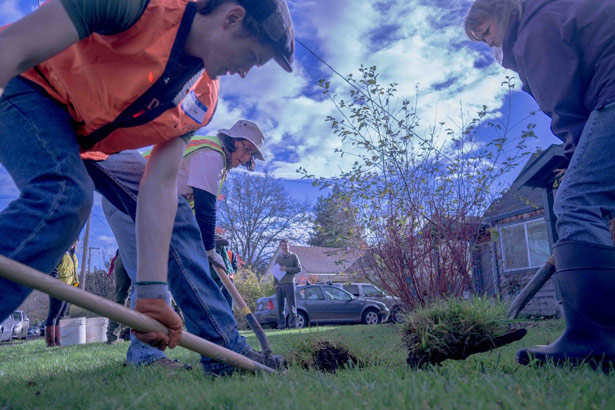
Treehuggers and Climate Change
The man who once tweeted, “The concept of global warming was created by and for the Chinese in order to make U.S. manufacturing non-competitive” is now the president-elect of the United States. In the week’s after his election, Donald Trump promptly picked Scott Pruitt, a climate change denialist, to lead the Environmental Protection Agency. WTF.
China is the largest greenhouse gas emitter and the U.S. is the second-largest. If Trump takes the U.S. out of the Paris climate change accords, and if he doesn’t enact the Obama administration’s Clean Power Plan, the world may not be able to slow the increase in global temperatures.
In other words, if we are not careful, under a Trump presidency, the Earth is screwed.
So what can you do? Protest. Act. Vote. Donate. Those are a few options. Locally, Lane County is rife with excellent organizations fighting to save the planet.
When it comes to climate change, Our Children’s Trust say, “As soon as he takes office, Our Children’s Trust will be actively fighting Trump and his administration in Federal Court — seeking a federal solution to dramatically reduce greenhouse gas emissions.
OCT has filed a lawsuit against the federal government on behalf of 21 youth plaintiffs from across the country. The suit alleges their generation’s constitutional rights to a stable climate have been violated by the government’s perpetuating our national dependence on fossil fuels. On Nov. 10, U.S. District Court Judge Ann Aiken ruled that the youth have the right to have their case hard in court.
Climate change activist Bill McKibben says, “Given the election, a courtroom may be the last place left where science will get a hearing.”
Find OCT at ourchildrenstrust.org or call 541-375-0158.
Trees also matter when it comes to climate change and saving the planet, Josh Laughlin of Eugene-based treehugging conservation group Cascadia Wildlands tells EW that “at a strategic planning retreat this past spring, Cascadia Wildlands tweaked its mission statement to now read: ‘We defend and restore Cascadia’s wild ecosystems in the forests, in the courts and in the streets.’”
He says, “With the election of Donald Trump, the addition of ‘in the streets’ couldn’t be more timely.”
Laughlin adds that Trump’s “anti-environmental campaign-trail bluster is being backed up by his transition team picks and cabinet-level appointments. With climate change skeptics and fossil fuel barons about to run the show, we are rolling up our sleeves and getting ready to rumble for the next four years.”
Laughlin predicts that Trump and a Republican Congress will: Gut key provisions of the Endangered Species Act; delist gray wolves from the Endangered Species Act to make it easier to kill them, weaken the Northwest Forest Plan to make it easier to clearcut remaining old-growth forests, and advance fossil fuel pipelines in the region, like the Pacific Connector in Coos Bay. Want to help Cascadia Wildlands fight back? Your tax-deductible donation can be made at cascwild.org or call 541-434-1463.
Chandra LeGue of Oregon Wild’s Eugene office says, “During the Trump administration, Oregon Wild will continue to fight for our old-growth forests, clean water and vulnerable wildlife like gray wolves.”
She says, “We’ll also work to build a broad, forward-looking coalition to defend Oregon icons like Crater Lake National Park, and our national forests and wildlife refuges. In our everyday work, we’re going to be the positive counter-balance to people like the Malheur militants and corporate politicians who want to seize and exploit our public lands.”
LeGue says that 40-plus-year-old Oregon Wild has a long history of protecting Oregon’s special places and, “We have seen presidential administrations that have been both good and terrible for our cause.”
But this time around? “What is different this time around is that not only are bedrock conservation laws like the Clean Water Act, Endangered Species Act and Antiquities Act threatened, but the very concept of national public lands.
You can find Oregon Wild at oregonwild.org or call 541-343-0996.
Environmental Law Alliance Worldwide helps communities speak out for clean air, clean water, and a healthy planet,” according to its mission statement. The global alliance of attorneys, scientists and other advocates ELAW helps challenge environmental abuses and builds a worldwide corps of skilled, committed advocates working to protect ecosystems and communities for generations to come, the group says.
After Trump was elected, ELAW here in the U.S. sent a message to their partners in 85 countries around the world that ELAW “will rededicate ourselves to our core work of building bridges across borders, strengthening the rule of law, advancing human rights, protecting the global climate and building a sustainable future.” MarketWatch has highlighted ELAW as one of “10 little-known charities that do the most good.” To donate go to elaw.org/give or call 541-687-8454. — Camilla Mortensen
Enlarge

Friends of Trees Fights Climate Change
Here in Eugene we breathe in green and we breathe out green (any kind of green you can think of). You can thank a tree for that clean air, but you should also tip your hat to Friends of Trees, a longtime Oregon nonprofit that has planted one-kajillion trees in Eugene, Salem and Portland since the 1970s.
Many of the towering oaks throughout the Whiteaker or the green-lit tunnels off various campus streets are the work of this environmental nonprofit. With Trump’s vitriolic threats to abandon new climate-change efforts, the work of nonprofits like Friends of Trees is starting to look like the first line of rational defense against a crazy person.
“In January, we have three green space plantings that are going to be really, really fun,” says Erik Burke, director of the Eugene office for Friends of Trees. Burke says the group will be “planting along I-105 in the Whiteaker and then in Springfield.”
Donations to the Eugene office will pay for young seedlings of Oregon white oak, black tupelo (black gum), chitalpa (a fast growing deciduous tree with radiant crowns of pink flowers), valley ponderosa pine and Oregon myrtle (a deep green native), among other tree species.
A major climate change threat is “urban heat islands,” Burke says. The little green saplings planted each month by volunteers are strategically placed throughout the city to help combat areas that get too hot each summer, which are the result of the way the city grew up around that area. Friends of Trees plants twice a month from October to April every year.
“For environmental issues, we are working really hard on trees that will be resilient to climate change in our selections,” Burke says. “We’ve been doing experiments on trees from California for the high vandalism, high rental area west of campus. Urban heat island effect is a really big one we address.”
Donations can be made to Friends of Trees at friendsoftrees.org or 503-282-8846. — Jeslyn Lemke
Beyond Toxics Takes On Big Business
Beyond Toxics is everything the Trump agenda hates. So give this group some love.
The folks at Beyond Toxics stand up for the environmental health of low-income and minority communities that have historically been disproportionately impacted by pollution.
“Our concern is primarily with people and their exposure and vulnerability to chemicals,” says Joel Iboa, the environmental justice community outreach manager.
Grassroots victories include forcing Union Pacific to clean up wetlands where they dumped creosote railroad ties, helping coastal communities stop a coal export terminal and fighting (and stopping) aerial herbicide sprays near some rural communities.
On the policy side, Beyond Toxics helped pass the law to ban field burning, passed the nations’ most protective pesticide regulations for school and banned gas stations from spewing the potent carcinogen benzene into nearby neighborhoods.
The group says that many toxics problems unfairly impact lower-income, rural and vulnerable communities. The concentration of polluting industries and lack of access to services that promote healthy living is especially burdensome because political and socio-economic conditions prevent these communities from demanding change, Beyond Toxics tells EW.
In the Trump era, expect less power for the poor and the vulnerable and more to go to Big Business and its polluting ways. Help Beyond Toxics fight for what’s right.
To donate go to beyondtoxics.org or call 541-465-8860.